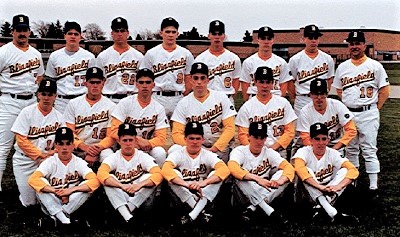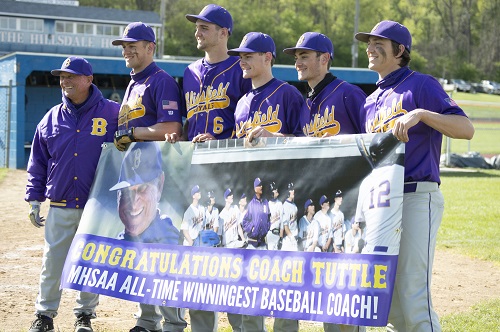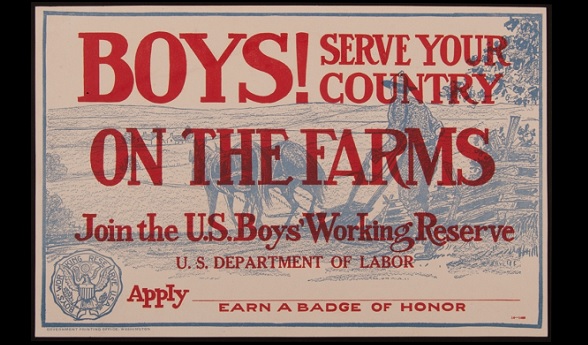
As Time Marches On, Tuttle's Blissfield Success Sets Record Pace
By
Doug Donnelly
Special for MHSAA.com
May 24, 2021
BLISSFIELD – Larry Tuttle spends a little more time in the dugout these days.
 The Blissfield coach, 76, says that is his daughter’s idea.
The Blissfield coach, 76, says that is his daughter’s idea.
“My daughter tells me she didn’t want me out there,” Tuttle said. “My reaction time isn’t what it used to be.”
Tuttle not coaching third base is something new. However, not much else has changed with the Blissfield baseball program since Tuttle arrived more than five decades ago as a budding baseball coach.
He was an assistant coach at Temperance Bedford who wanted to be a varsity head coach. Blissfield gave him that opportunity, and he never left.
“They asked me if I wanted to coach track,” Tuttle said. “I said, ‘No, I want to coach baseball.’”
Earlier this month, Tuttle’s Royals beat Hillsdale, on the road, in front of a large contingent of former players, parents and community members who made the trip to witness history. With a 15-0 win in the opening game of the Lenawee County Athletic Association doubleheader, Tuttle passed former Grand Ledge head coach Pat O’Keefe to become the winningest high school baseball coach in state history.
Blissfield is up to 27-3 this season, giving Tuttle 1,324 career victories. O’Keefe compiled 1,315 wins during 1968 and then between 1970 and 2019 before stepping down. Both are in the Michigan Baseball Hall of Fame.
“Pat and I go back a long way,” Tuttle said. “We’ve known each other a long time. We were both active in the coaches association as board members. He is a good man. This record has been between he and I for many, many years.”
 The secret to Tuttle’s success is that he treats today’s games pretty much the same way he did when he took over the program in 1968.
The secret to Tuttle’s success is that he treats today’s games pretty much the same way he did when he took over the program in 1968.
“The expectations don’t change,” Tuttle said. “That’s important. It is the same today as it was with all my teams. You set that expectation early on. The kids have been great.”
Tuttle has had enormous success at Blissfield. This week the Royals clinched the LCAA tittle, the 40th league title Tuttle has won during his 53 seasons. Also during that span, Blissfield has won 32 District, 23 Regional and seven MHSAA Finals championships. His most recent Finals title came in 2003, which, at the time, was his third in four years.
He has coached several baseball players that went on to play in college, several at the Division I level, and around a dozen who were either drafted or signed as free agents with Major League Baseball organizations. A couple of them have made it to the Major Leagues, and others have remained in professional baseball as coaches or managers at one level or another.
Steve Babbitt moved to Blissfield in the late 1980s when he was hired as a teacher, and became Tuttle’s assistant coach. He eventually became Blissfield’s athletic director. He was in the district for 30 years, and has retired – and Tuttle is still at it.
“He already was the head coach for 20 years when I got here, and now I’m retired and he’s still coaching,” Babbitt said. “It’s remarkable. … For somebody to be as passionate as Larry and to do it as long as he has, for more than 53 years, is unbelievable.”
Babbitt said Tuttle might have mellowed a little bit over the years, but, to his credit, he’s adapted his coaching style while keeping the expectations the same.
“Once you cross that line and get on the field, nothing has changed,” Babbitt said. “The expectations are the same. He loves the game.”
Tuttle coached third base up until this season, when he decided to turn that duty over to assistant Eric Schmidt, one of his former players. Tuttle not only coached Schmidt, but Schmidt’s father as well. The Royals have several coaches, all with various duties.
“Eric is doing third base this year and doing an excellent job,” Tuttle said.
Matt Ganun and Matt Jones – both former Royals baseball players – take turns coaching first base. Another former Royal, Jeff Jackson, helps relay Tuttle’s calls from the dugout.
“Jackson and Ganun were on the 1992 state championship team,” Tuttle said. “They know the game.”
Having so many coaches in the dugout is a blessing, Tuttle said.
 “I’ve got a lot of great coaches with me,” Tuttle said. “Everybody knows their responsibility and it just falls into place, much better than anybody thinks. If someone look at us, it looks like we are stumbling over ourselves. That’s not the case at all.”
“I’ve got a lot of great coaches with me,” Tuttle said. “Everybody knows their responsibility and it just falls into place, much better than anybody thinks. If someone look at us, it looks like we are stumbling over ourselves. That’s not the case at all.”
Tuttle has heard from several of his former players and community members since setting the wins record.
“I’ve had a number of players who have contacted me, some over the internet, some have phoned. It has been very exciting from that standpoint and very rewarding to hear from them,” Tuttle said.
“I heard from Brad Fischer. He has been in pro baseball for 43 years with various teams, Major League teams. … He made a comment to me that really hit home. He said, ‘Coach, if it hadn’t been for you, my career in baseball would never have happened.’ That really hits home when someone tells you that. Then I know maybe I’ve had an impact on some lives.”
Blissfield is enjoying one of its best seasons in years, led by five seniors – Nolan Savich, Ty Wyman, Zack Horky, Scott Jackson and Gavin Ganun. Ganun and Horky have signed to play at Bowling Green State University next season.
Tuttle’s goals have been the same pretty much every season for years – win the league, win the District, and make a deep MHSAA Tournament run. This year’s team is ranked No. 6 in the most recent Division 3 coaches association poll.
Breaking the record also brought a lot of attention, from newspaper and television stations to Bally’s Sports Detroit doing a segment on Tuttle and the team for a Detroit Tigers pre-game show.
“It’s been exciting,” Tuttle said. “It’s been good for our whole community and the school system. In a small town, the school system is a major part of the community.”
Tuttle lives across the street from Blissfield High, not much more than a long fly ball from the Royals’ stadium. Most days, especially this time of the year, that is where you will find him, working on the field.
“I don’t do as much as I used to because I have a lot of people helping me,” Tuttle said. “Some of the other coaches won’t let me now. But I’m over there almost every day doing something, because usually there’s something that has to be done to keep it looking like it does.”
Some things never change.
 Doug Donnelly has served as a sports and news reporter and city editor over 25 years, writing for the Daily Chief-Union in Upper Sandusky, Ohio from 1992-1995, the Monroe Evening News from 1995-2012 and the Adrian Daily Telegram since 2013. He's also written a book on high school basketball in Monroe County and compiles record books for various schools in southeast Michigan. E-mail him at [email protected] with story ideas for Jackson, Washtenaw, Hillsdale, Lenawee and Monroe counties.
Doug Donnelly has served as a sports and news reporter and city editor over 25 years, writing for the Daily Chief-Union in Upper Sandusky, Ohio from 1992-1995, the Monroe Evening News from 1995-2012 and the Adrian Daily Telegram since 2013. He's also written a book on high school basketball in Monroe County and compiles record books for various schools in southeast Michigan. E-mail him at [email protected] with story ideas for Jackson, Washtenaw, Hillsdale, Lenawee and Monroe counties.
PHOTOS: (Top) Blissfield coach Larry Tuttle poses for photos with his team after setting the MHSAA record for baseball coaching wins this month. (Middle) Tuttle’s 1992 team was among his Finals champions; he is standing back row, far right. (Below) Tuttle with this season’s five seniors. (2021 photos courtesy of Joe Flaherty. 1992 photo from MHSAA files.)

'Over Here,' Athletes Gave to WWI Effort
March 28, 2018
By Ron Pesch
Special for Second Half
In a nation at war, the needs of many outweigh the desires of a few.
Among the many noble sacrifices for the greater good was Michigan’s spring high school sports season of 1918.
The United States’ entry into “The Great War” (today commonly known as World War I) came on April 6, 1917, 2½ years after the war had begun. First elected President of the United States in 1912, Woodrow Wilson earned re-election in 1916 under a platform to keep the U.S. out of the war in Europe. The sinking of the British passenger ships Arabic and Lusitania in 1915 caused the death of 131 America citizens, but did not invoke entry into the conflict. However, continued aggressive German actions forced a reversal in policy.
“The present German submarine warfare against commerce is a warfare against mankind,” stated Wilson in an April 2 special session of Congress, in requesting action to enter the war.
A huge baseball fan, President Wilson recognized the value of entertainment and athletics during a time of crisis. Major league baseball, America’s pastime, completed a full schedule in 1917. A former president at Princeton University, on May 21, 1917, Wilson addressed the value of school athletics in a letter to the New York Evening Post.
 “I would be sincerely sorry to see the men and boys in our colleges and schools give up their athletic sports and I hope most sincerely that the normal courses of college sports will be continued so far as possible, not only to afford a diversion to the American people in the days to come when we shall no doubt have our share of mental depression, but as a real contribution to the national defense. Our young men must be made physically fit in order that later they may take the place of those who are now of military age and exhibit the vigor and alertness which we are proud to believe to be characteristic of our young men.”
“I would be sincerely sorry to see the men and boys in our colleges and schools give up their athletic sports and I hope most sincerely that the normal courses of college sports will be continued so far as possible, not only to afford a diversion to the American people in the days to come when we shall no doubt have our share of mental depression, but as a real contribution to the national defense. Our young men must be made physically fit in order that later they may take the place of those who are now of military age and exhibit the vigor and alertness which we are proud to believe to be characteristic of our young men.”
Despite the highest of hopes, the requirements and realities of war deeply impacted life in the U.S. soon after.
In February of 1918, a proposal was circulated by Dr. John Remsen Bishop, principal of Detroit Eastern High School and president of the Michigan Interscholastic Athletic Association, to abolish spring athletics at Michigan high schools. Due to a labor shortage brought on by the war, the states, including Michigan, needed help on farms, harvesting crops from spring until late fall. The action might also affect the football season of 1918.
The Boys’ Working Reserve, a branch of the U.S. Department of Labor, was organized in the spring of 1917 and designed to tap into an underutilized resource to help address that labor deficiency. “Its object was the organization of the boy-power of the nation for work on the farms during the school vacation months.”
While the idea was popular among schools around Detroit, due to the lack of public commentary from outstate school administration, it was expected that the proposal would meet at least some opposition when the M.I.A.A. gathered on Thursday, March 28 in Ann Arbor during a meeting of the state’s Schoolmasters Club.
Less than two weeks prior to the March meeting, Michigan Agricultural College made an announcement that would impact one aspect of the coming spring sports season.
“The department of athletics of the Michigan Agricultural College begs to inform the high schools of the state that plans for the annual interscholastic track meet, which was to have been conducted here in June, have been given up this year – not through any desire on the part of this department to discourage athletics, but because this is a time when we can and should devote our resources to better uses,” said coach Chester L. Brewer of the Aggies to the Lansing State Journal. “It would hardly be sound judgment for us to make our usual elaborate plans for this meet while our government is appealing to all of us to economize and exercise the utmost thrift. Neither is it wise policy to encourage unnecessary traveling upon the railroads, or to ask high schools of the state to make any expenditures other than those which are absolutely necessary.”
Earlier in the year, similar news had come from the University of Michigan.
In January of 1917, the University of Michigan had announced plans for an elaborate annual high school basketball invitational, designed to identify a Class A state champion. Billed as the “First Annual Interscholastic Basket Ball Tournament,” the March event hosted 38 teams. However, influenced by the war, a decision had been made not to run a second tournament in 1918. Instead, on March 27, Kalamazoo Central and Detroit Central, two of the state’s top teams, were invited to Ann Arbor for a hastily arranged contest at U-M’s Waterman Gymnasium. The schools had split a two-game series during the regular season. Kalamazoo won the season’s third matchup, and while not official, declared itself 1918 Michigan state champion.
Into this environment of patriotism and uncertainty, school administrators arrived in Ann Arbor for the Schoolmasters gathering. There, in the morning, the membership heard a presentation from H. W. Wells, assistant and first director of the Boys’ Working Reserve. “The heart of the nation, rather than the hearts of the nation, is beginning to beat. War is making us a unit,” said Wells, discussing the aim to recruit boys between the ages of 16 and 21 to help provide food for the allies in Europe and at home in the United States.
 “Wells told of the need for the farmers to sow more wheat, and plant more corn,” reported the Ann Arbor News, “and in the same breath he told of great corn fields all over the country, where last year’s corn still lay unhusked, because of a lack of farm labor.”
“Wells told of the need for the farmers to sow more wheat, and plant more corn,” reported the Ann Arbor News, “and in the same breath he told of great corn fields all over the country, where last year’s corn still lay unhusked, because of a lack of farm labor.”
It was estimated that 25 percent of the nation’s farm workforce was now active in the armed forces.
The proposition was brought to the M.I.A.A. by Lewis L. Forsythe, principal at Ann Arbor High School, who would soon establish himself as a guiding force in high school athletics. The proposal “was discussed thoroughly.”
“This session is usually a stormy one, because of contentions that arise over rulings that affect schools in different ways,” said Adrian superintendent Carl H. Griffey to the Adrian Daily Telegram, “but this meeting was a serious one in which all matters were related to our national welfare and passed by unanimous votes.”
So, one day after the conclusion of the abbreviated state basketball championship contest, the spring prep sports season in Michigan came to an abrupt halt. Michigan’s male high school students were asked to work to support the war effort.
“Chances are that they will remain there for the duration of the war,” stated the Lansing State Journal in response to the action. “At the meeting … it was talked of quitting football because of the need of the boys staying on the farms till the latter part of November. This is highly probable. If it is passed upon then Michigan high schools will have but one sport, basketball.
“Whether intra-mural sports will replace the representative teams is not known. This form of athletics demands the attention of a great number of teachers to tutor the different class organizations. The teachers are taxed to the limit at present and cannot give the time to sports. Organizing farm classes and Liberty bond teams is taking the teacher’s spare moments. … But still athletics are needed, as the war has demonstrated, and physical training should be instituted from the kindergarten to the university.“
“Those lads who leave for the farms the first of May,” wrote the Port Huron Times-Herald, “will be in better condition when they return home from the fields and cow lanes than they would (have) had they remained in the city until June batting the leather pill.”
The fate of the 1918 football season would not be known until late August.
In late June, the 29th Governor of Michigan, Albert E. Sleeper, thanked the estimated 8,000 students who had joined the ranks.
 “To you soldiers of the soil I would say this, that I am as proud to address you as I would be to address any of the boys who are bearing arms for their country. You have proved that you are true patriots, for you have started out to do exactly what your country has asked you to do – the thing which you can do best for your country at this time.
“To you soldiers of the soil I would say this, that I am as proud to address you as I would be to address any of the boys who are bearing arms for their country. You have proved that you are true patriots, for you have started out to do exactly what your country has asked you to do – the thing which you can do best for your country at this time.
“Every day, in the rush of official work, I think of you Reservists as you work on the farms, just as I think of our soldiers who are in training camps or ‘over there.’ And I am just as proud of you as I am of them. So are all the people of Michigan.”
It was estimated “the boys who last spring left their high school studies and as members of the United States Boys’ Reserve have helped the Michigan division to add $7,000,000 to the food production of the nation.”
In September, Byron J. Rivett, secretary of the M.I.A.A., announced that, based on a vote of member high schools, prep sports would be resumed in the fall. The Detroit News celebrated the news that “moleskins and pigskins will be in evidence and the grand old game will be a part of the autumn’s entertainment.”
In October, in Grand Rapids and Detroit and other cities across the state, officials gathered to honor those who served as part of the “Michigan Division of the Reserve” and to award bronze badges in recognition for their contribution to the war effort.
World War I officially ended on November 11 with the signing of the armistice. Armistice Day, today known as Veteran’s Day, was first celebrated in 1919. In total, an estimated 16 million were killed during the war.
“Four million ‘Doughboys’ had served in the United States Army with the American Expeditionary Forces (AEF). Half of those participated overseas,” said Mitchell Yockelson in Prologue magazine, a publication of the National Archive. “Although the United States participated in the conflict for less than two years, it was a costly event. More than 100,000 Americans lost their lives during this period.”
More than 5,000 of those casualties had come from Michigan.
***
 To the surprise of the world, a second war arrived in 1918. This one did not discriminate based on geographic or political borders. It would take more lives than World War I.
To the surprise of the world, a second war arrived in 1918. This one did not discriminate based on geographic or political borders. It would take more lives than World War I.
Globally, the Spanish Flu pandemic arrived in three waves, one in the spring, one in the fall of 1918, and a third arriving in the winter of 1919 and ending in the spring. It, too, would impact high school and college athletics in Michigan and beyond, as countless football games across the nation were cancelled in an attempt to help reduce the spread of the disease.
In the end, an estimated 675,000 would die in the United States from the virus. In Michigan, hundreds succumbed in October 1918 alone. In Detroit, between the beginning of October and the end of November, “there were 18,066 cases of influenza reported to Detroit’s Department of Health. Of these, 1,688 died from influenza or its complications.” Worldwide, an estimated 50 million were killed by the Influenza pandemic of 1918-1919.
 Ron Pesch has taken an active role in researching the history of MHSAA events since 1985 and began writing for MHSAA Finals programs in 1986, adding additional features and "flashbacks" in 1992. He inherited the title of MHSAA historian from the late Dick Kishpaugh following the 1993-94 school year, and resides in Muskegon. Contact him at [email protected] with ideas for historical articles.
Ron Pesch has taken an active role in researching the history of MHSAA events since 1985 and began writing for MHSAA Finals programs in 1986, adding additional features and "flashbacks" in 1992. He inherited the title of MHSAA historian from the late Dick Kishpaugh following the 1993-94 school year, and resides in Muskegon. Contact him at [email protected] with ideas for historical articles.
PHOTOS: (Top) The U.S. Department of Labor recruited high school students to work on farms as soldiers went oversees to fight World War I. (Middle top) A Working Reserve badge. (Middle) Lewis L. Forsythe. (Below) Another recruitment poster for the Working Reserve shows a man plowing a field while war rages in the background. (Photos collected by Ron Pesch.)

